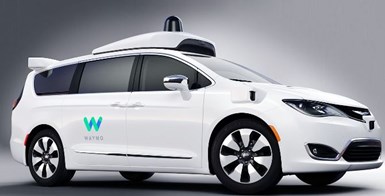Waymo Reports Autonomous Safety Record
47 incidents in 21 months, with no injuries or at-fault accidents
#regulations
Waymo has issued a new report and two accompanying white papers that detail its self-driving-vehicle operations, including the safety performance of the company’s fleet in Arizona.

(Images: Waymo)
Waymo touts the reports as the most comprehensive and transparent analysis issued on autonomous vehicles.
The company and dozens of competitors testing self-driving cars in California are required to issue annual reports. But these typically have been brief overviews that list accidents and the number of “disengagements” that required backup drivers to take control of a vehicle operating in autonomous mode.
Big Picture
The latest Waymo analysis is derived from data collected during 6.1 million miles of automated driving from January 2019 through the first nine months of 2020 in the metropolitan Phoenix area. This includes 65,000 miles of driverless operation (no backup driver onboard) this year.
Waymo operates about 600 prototype self-driving vehicles in the area. Most are Chrysler Pacifica hybrid minivans, while the rest are Jaguar I-Pace electric crossover vehicles.
Here are a few top line numbers:
47 — The number of collisions and near misses (actual and simulated) involving Waymo vehicles during the 21-month evaluation. The total includes 16 rear-end events, 15 angled, 10 sideswipes, three single vehicle, two reversing and one head-on collision in which the other vehicle was traveling in the wrong direction at night.
29 — Of the total, 60% of the incidents were simulated based on the conditions of when a disengagement occurred. In these so-called “counterfactual” what-if scenarios, Waymo calculated the likely real-world outcome if a safety driver hadn’t intervened.
18 — Real world incidents with other road users. Waymo classified all of these as minor events without any significant injuries.
8 — Airbag deployments, including three actual and five simulated events.
0 — There were no crashes involving road departures, hitting fixed objects or rollovers. (These types of crashes categories account for about 27% of U.S. road fatalities.)
100% — Waymo claims nearly all of the incidents (actual and simulated) were caused in some way by the other road user—including two cases of a pedestrian or cyclist running into a Waymo vehicle—violating traffic rules.

There was one questionable case in which a Waymo vehicle rear-ended another car that had cut it off and slammed on the brakes. The report suggests the driver of the other car knew the Waymo vehicle was operating autonomously and deliberately tried to interfere with it.
Shared Experience
Despite the relatively low number of accidents, Waymo says the results underscore the need for caution during the transition to semi- and fully autonomous vehicles.
“The frequency of challenging events that were induced by incautious behaviors and other drivers serves as a clear reminder of the challenges in collision avoidance so long as AVs share roadways with human drivers,” the authors note.
“Statistics regarding the high percentage of human collisions that are attributed to human error may lead to inflated expectations of the potential immediate safety benefits of AVs,” Waymo warns. “AVs will share roads with human drivers for the foreseeable future, and significant numbers of collisions due to human driver errors that are simply unavoidable should be expected during this period.”
Others point out that the Phoenix tests likely are skewed because vehicles there typically are driven under near-ideal traffic and weather conditions.
Waymo concedes that the data reflect a snapshot in time. But the company says the report will help it and others move forward on the path to full autonomy.
“The most significant long-term contributions of this paper will likely not be the actual data shared,” the authors assert, “but the example set by publicly sharing this type of safety performance data that this paper fosters.”
RELATED CONTENT
-
Rage Against the Machine
There have been more than 20 reported attacks against Waymo’s self-driving fleet in Chandler, Ariz., since the company began testing the technology on public roads there two years ago.
-
BMW Granted License to Test Self-Driving Cars in Shanghai
BMW AG has become the first foreign carmaker to win permission to test autonomous vehicles on public roads in China, according to the Shanghai Daily.
-
Study: How States Should Update Traffic Laws for Autonomous Cars
U.S. states should require that all automated cars have a licensed driver on board, suggests a study by the Governors Highway Safety Assn.








